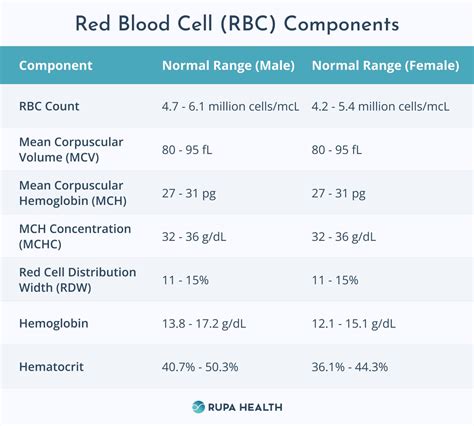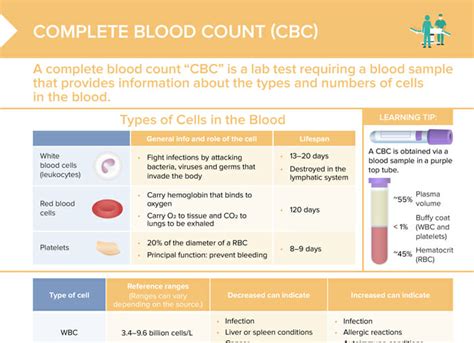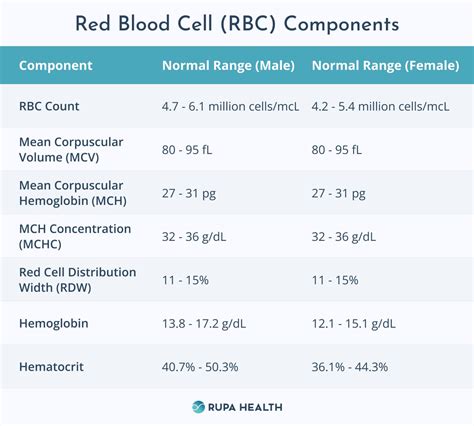Intro
Unlock 5 CBC blood count tips to decode your complete blood count results, understanding white blood cell count, red blood cell count, hemoglobin, and platelet count for better health insights.
A Complete Blood Count (CBC) is a crucial diagnostic tool that provides valuable insights into an individual's overall health. It measures various components of the blood, including red and white blood cells, platelets, and hemoglobin. Understanding the importance of a CBC can help individuals take proactive steps towards maintaining their health. In this article, we will delve into the world of CBC blood counts, exploring their significance, benefits, and what the results can reveal about a person's health.
The CBC is a widely used test that helps healthcare professionals diagnose and monitor a range of conditions, from anemia and infections to blood disorders and cancer. By analyzing the different components of the blood, doctors can identify potential health issues before they become severe. This early detection enables timely interventions, which can significantly improve treatment outcomes. Moreover, a CBC can help individuals understand their risk factors for certain diseases, allowing them to make informed lifestyle choices.
A CBC is typically performed as part of a routine medical exam or when symptoms such as fatigue, weakness, or bruising are present. The test is relatively simple, involving a blood draw from a vein in the arm. The collected blood sample is then sent to a laboratory for analysis. The results provide a comprehensive picture of the blood's cellular composition, including the levels of different cell types, their sizes, and their distribution. This information can be used to diagnose a range of conditions, from mild to severe.
Understanding CBC Results

To interpret CBC results, it's essential to understand the different components measured during the test. These include red blood cells (RBCs), white blood cells (WBCs), platelets, hemoglobin, and hematocrit. Each of these components plays a vital role in maintaining the body's overall health. For instance, RBCs are responsible for carrying oxygen throughout the body, while WBCs help fight infections. Platelets, on the other hand, are crucial for blood clotting. By analyzing these components, healthcare professionals can identify abnormalities that may indicate an underlying health issue.
Components of a CBC
A CBC measures several key components of the blood, including: * Red Blood Cells (RBCs): These cells carry oxygen from the lungs to the body's tissues. * White Blood Cells (WBCs): These cells help fight infections and diseases. * Platelets: These small cells play a crucial role in blood clotting. * Hemoglobin: This protein in RBCs carries oxygen throughout the body. * Hematocrit: This measures the proportion of RBCs in the blood.Benefits of Regular CBC Tests

Regular CBC tests offer numerous benefits, particularly for individuals with a history of blood disorders or those who are at risk of developing certain conditions. By monitoring the blood's cellular composition, healthcare professionals can:
- Detect anemia and other blood disorders early
- Identify potential infections or diseases
- Monitor the effectiveness of treatments
- Adjust medication or therapies as needed
Who Should Get Regular CBC Tests?
Regular CBC tests are recommended for: * Individuals with a history of blood disorders * Those with a family history of blood-related diseases * People taking medications that may affect blood cell production * Individuals with symptoms such as fatigue, weakness, or bruising5 CBC Blood Count Tips

To get the most out of a CBC test, follow these tips:
- Understand your results: Take the time to discuss your CBC results with your healthcare provider, and ask questions if you're unsure about any aspect of the test.
- Monitor your diet: A healthy diet rich in essential nutrients can help maintain healthy blood cell production.
- Stay hydrated: Adequate hydration is crucial for blood production and overall health.
- Avoid certain medications: Certain medications, such as those containing ibuprofen or aspirin, can affect blood cell production. Consult with your healthcare provider before taking any medication.
- Get regular tests: Regular CBC tests can help identify potential health issues early, enabling timely interventions and improving treatment outcomes.
Preparing for a CBC Test
To prepare for a CBC test: * Avoid eating or drinking for at least 8 hours before the test * Inform your healthcare provider about any medications or supplements you're taking * Wear comfortable clothing and avoid tight sleeves that may interfere with the blood drawCommon CBC-Related Questions

Some common questions related to CBC tests include:
- What does a high or low WBC count indicate?
- How often should I get a CBC test?
- Can a CBC test diagnose cancer?
Addressing Concerns and Misconceptions
It's essential to address any concerns or misconceptions about CBC tests. For instance, some individuals may worry about the pain or discomfort associated with the blood draw. However, the procedure is relatively quick and painless. Others may be concerned about the cost or accessibility of CBC tests. In most cases, CBC tests are covered by health insurance and can be performed at a local healthcare facility.Staying Informed and Proactive

By staying informed and proactive about CBC tests, individuals can take control of their health and make informed decisions about their well-being. This includes:
- Understanding the importance of regular CBC tests
- Recognizing the benefits and limitations of CBC tests
- Asking questions and seeking clarification about test results
- Making lifestyle changes to maintain healthy blood cell production
Empowering Individuals through Education
Education and awareness are key to empowering individuals to take control of their health. By understanding the basics of CBC tests and their importance, individuals can make informed decisions about their health and well-being. This includes recognizing the signs and symptoms of potential health issues, seeking medical attention when necessary, and adopting healthy lifestyle habits.What is a CBC test, and why is it important?
+A CBC test is a diagnostic tool that measures the different components of the blood, including red and white blood cells, platelets, and hemoglobin. It's essential for detecting and monitoring various health conditions, from anemia and infections to blood disorders and cancer.
How often should I get a CBC test?
+The frequency of CBC tests depends on individual factors, such as age, medical history, and risk factors. Generally, healthy adults may need a CBC test every 1-3 years, while those with a history of blood disorders or other health conditions may require more frequent testing.
Can a CBC test diagnose cancer?
+A CBC test can help identify abnormalities in the blood that may indicate cancer, but it's not a definitive diagnostic tool. Additional tests, such as imaging studies or biopsies, are often necessary to confirm a cancer diagnosis.
In
